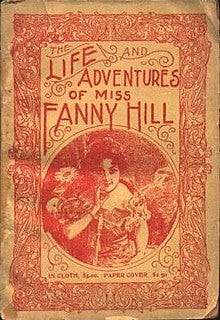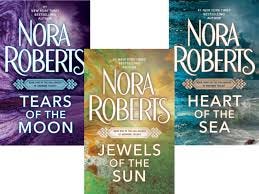TW: References to sexual assault
RomCo Word of the Year: Spicy
In the romance publishing world, "spice" has emerged as this year's buzzword. Whether you're scrolling through BookTok or perusing the shelves at Barnes & Noble, it's impossible to escape the term. How does ‘spicy’ differ from its predecessors: ‘smutty’ and ‘steamy’? That debate is too nuanced for the lay-reader to understand—I kid… they are all marketing terms with broad uses and ill-defined definitions. Ultimately, it comes down to how sexually explicit and alluring readers find a particular book.
While spicy novels are flying off the shelves and filling your Kindle through that tempting Kindle Unlimited subscription, spicy fiction is far from new. From ancient cave paintings to Ottoman poetry, every culture has produced its form of sexually explicit literature. Despite numerous attempts at censorship and bans, sexy books have remained popular for centuries. And really, what makes something more desirable than being told you can’t have it? From the first erotic novel to the current BookTok craze, this is an exploration of all things spice.
"Every generation thinks they invented sex, and every generation is wrong" Robert Heinlein
Fanny Hill, aka Seditious Spice
Fanny Hill: Memoirs of a Woman of Pleasure by John Cleland is often hailed as a groundbreaking work in English literature. According to David Foxton in his work Libertine Literature in England, Fanny Hill is the "first English prose pornography," effectively establishing it as the first modern spicy novel. While earlier works, such as the Kama Sutra, served as sex manuals, Fanny Hill holds the distinction of being the first sexually explicit novel in English fiction.
Cleland published the novel in two installments from the infamous Fleet Prison in 1748. The book is an epistolary memoir narrated by the middle-aged Fanny Hill, who recounts her scandalous life after losing her parents to smallpox and moving to London in search of work. Instead of finding conventional employment, she quickly becomes entangled in the world of prostitution and paid companionship.
Fanny Hill is not a traditional romance novel, yet it stands out for portraying female pleasure without punishment. Instead of facing destitution for her lack of virtue, Fanny ultimately finds wealth and happiness and even marries her first love. However, while Fanny herself avoids recrimination within the story, the novel faced significant backlash in the real world.
Both the author and publisher were charged with corrupting the King’s subjects. Though pirated copies remained popular, the novel wasn't legally published again for over a century. Even in free-loving 1960s London, the Metropolitan Police raided a shop thought to be selling the novel—they were.
The puritanical prudes of Boston* banned the book in 1821. The legal battles surrounding Fanny Hill continued into the 1960s when the Massachusetts Supreme Court again ruled that the novel was too obscene for the gentle public. The case was elevated to the United States Supreme Court, which handed down a decision now known as Memoirs v. Massachusetts. As you may have guessed, the ban was lifted—a huge win for smut-mongers everywhere.
*I’m from Massachusetts, so I can say this
Massachusetts v. Smut
After Memoirs v. Massachusetts, there was no putting the genie back in the bottle. Lamp rubbing became a popular literary genre. Books that featured more explicit content began to flourish. Novels like The Flame and the Flower, often considered the first bodice ripper, paved the way for spicy literature to become mainstream.
The depiction of sex on the page evolved dramatically throughout the 20th century. Transitioning from the chaste romances of Georgette Heyer to the bodice ripper genre represented a seismic shift. However, the stigma surrounding women’s virtue persisted. Bodice rippers often began with rape; the virginal heroine, unwilling to surrender her virtue, was introduced to sexuality through force. This narrative device allowed the heroine to remain blameless in the ensuing relationship, often learning to enjoy sex and eventually falling in love with her rapist. It’s no wonder these books have not maintained their popularity, and I hesitate to recommend them unless it’s for historical context.
Fortunately, as the decades progressed, non-consensual sex began to fall out of favor, along with the rigid expectations of virginity. By the late 1970s, women's sexuality was increasingly portrayed in a positive light, reflecting a shift in societal attitudes. Authors like Nora Roberts and Jackie Collins emerged, popularizing explicit contemporary romance. Yet, despite their success, spicy romance novels still carried a considerable stigma.
Modern Tastes
Are we past the stigma surrounding romance novels? Not quite. Terms like "fairy porn" are still used in articles, and self-proclaimed "serious journalists" often approach romance as a form of literary slumming. However, the landscape has undeniably improved. I attribute much of this change to the rise of e-readers, which offer readers anonymity in their purchases and reading habits. The only incriminating evidence of one’s literary choices is found on their Kindle—safeguarded behind lock and key aka password protected.
Readers are now able to get their freak on with none the wiser. However, a novel will break through to the mainstream every few years. Think of Fifty Shades of Grey or the current gateway drug to spicy romance: A Court of Thorns and Roses. Having sold over 3.1 million copies, ACOTAR author Sarah J. Maas is already the best-selling author of 2024. That’s a lot of spice in circulation. These novels bring many new readers - they come for a laugh and stay for the spice.
While there isn’t data to support this claim (which has never stopped me before), it looks like spice is on trend to outsell its ‘clean’ counterpart. You know what they say: sex sells. Gone are the days of hiding Fabio behind a non-fiction dust jacket. So go out into the world and proudly read that filth on your Kindle, you pervert!












If Project 2025 goes through, romance novels with “spicy” or “steamy” content could be in serious trouble, with authors and distributors even facing charges for creating or sharing so-called “pornographic” material. Yes, Fanny Hill still found its way into readers’ hands through pirated copies. While history shows us that banning sexy books doesn’t work, Project 2025 could throw romance publishing into a new era of restrictions—authors and distributors of romance novels with explicit content could face severe legal consequences.For authors and fans, this could mean rethinking how to write, read, and distribute the kind of romance that readers love.